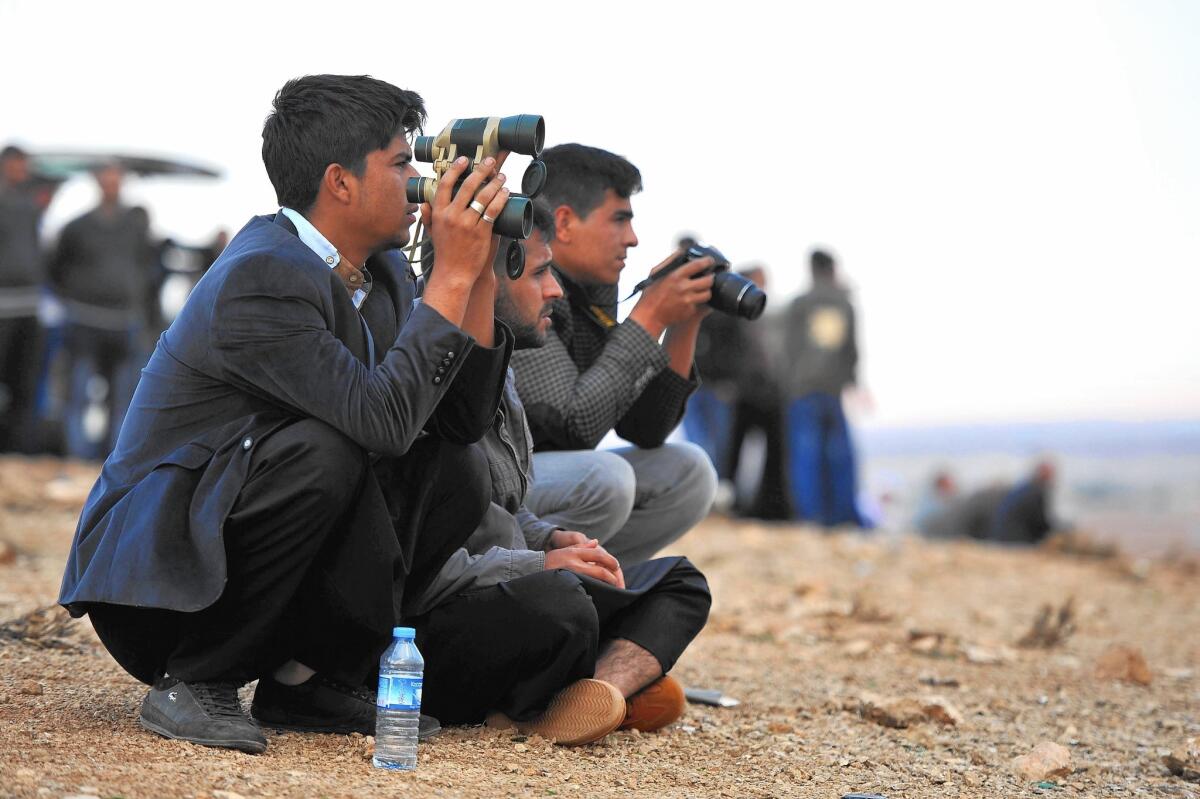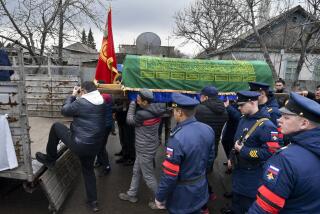Kurdish fighters in Syria are desperate for promised reinforcements

- Share via
Reporting from Mursitpinar, Turkey — Mahmoud Imam draws smoke from a cigarette, squints and points to his village in the farmlands of Syria just east of the besieged Kurdish city of Kobani.
He laments that he cannot reach his home and beloved tractor, clearly visible about 500 yards away across Turkey’s southern border but under the control of Islamic State extremists.
He fled his home as the Sunni militants swept into Kobani’s environs last month, and he managed to have himself smuggled to Turkey a week ago. Now, like many, he has pinned his hopes on the arrival of Iraqi Kurd fighters known as peshmerga, or “those who face death.”
“At this stage we will accept anyone who is willing to save our soil from Islamic State,” Imam, 41, said Monday. “If the peshmerga do come, we will treat them as brothers.”
For the last 40 days, Kurdish fighters in Kobani have fended off an Islamic State advance into the city. A U.S.-led campaign of airstrikes has helped blunt the advance, but the Kurdish defenders remain vastly outgunned and short on ammunition.
Officials from the Kurdistan Regional Government in northern Iraq last week confirmed that they would send 150 peshmerga equipped with heavy weaponry to Kobani. But the convoy has yet to arrive, amid suspicions that Turkey is impeding its passage.
“This is all because of [Turkish President Recep Tayyip] Erdogan,” Imam said. “He is afraid of Kurdish unity. But they [Iraqi Kurds] are our relatives.”
Erdogan has touched off a wave of Kurdish anger in Turkey by enforcing a blockade of Kobani. Meanwhile, he has called for the imposition of a no-fly zone in Syria as a prerequisite to allowing support to the Kurds, insisting that leadership change in Syria should be Washington’s priority.
But officials in Ankara, the Turkish capital, last week approved allowing peshmerga fighters to enter Kobani through Turkey, a major shift in policy.
The Kurds fighting in Kobani are members of the Popular Protection Units, or YPG, which is linked to the outlawed Kurdistan Workers Party, or PKK, in Turkey.
The PKK has waged a three-decade insurgency against the Turkish state. Ankara considers it a terrorist group and has long feared any sign of Kurdish unity along its southeastern flank.
Kurdish populations, all with aspirations of autonomy, are found in Iran, Iraq, Syria and Turkey.
“It is better that the Kurds act as a unit,” Pasha Mahmoud, a 54-year-old refugee from Kobani, said Monday, running prayer beads between his fingers. “Because of this conflict, it is happening now. After this, Kurdistan will absolutely be a single unit.”
The rattle of gunfire rings out in sustained blasts from Kobani, punctuated by occasional mortar fire. The battle for the city has largely ground to a tenuous stalemate.
Islamic State fighters are setting houses ablaze, sending up a shroud of smoke intended to reduce visibility and hamper coalition airstrikes. And they have become increasingly reliant on suicide car and motorcycle bombings, activists and residents said.
Over the weekend, U.S. warplanes destroyed vehicles and a building used by the group, according to the Pentagon, raising the total number of strikes against Islamic State around the city to more than 150.
Meanwhile, residents who recently fled to Turkey recall the hardships of life under siege.
“Life is difficult,” said Omar Ibrahim, 47, who sneaked under cover of darkness into Turkey 15 days ago with his wife and seven daughters. “There is no electricity or water. People hide food away to eat in a month or two. We were always afraid from the bombings and shooting.”
Bozan Ahmed, 21, said Kobani’s remaining residents have banded together, sharing food and supplies. Ahmed came to Turkey five days ago, accompanying his brother, who was shot twice in the chest while battling Islamic State militants.
“Sometimes we run out of food,” Ahmed said. “But it is car bombs and mortars that make our lives difficult.”
Johnson is a special correspondent.
More to Read
Sign up for Essential California
The most important California stories and recommendations in your inbox every morning.
You may occasionally receive promotional content from the Los Angeles Times.











